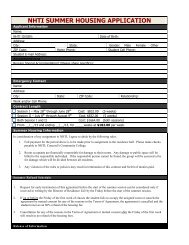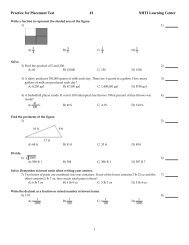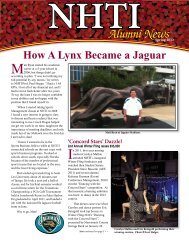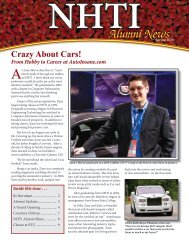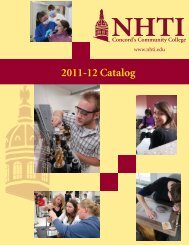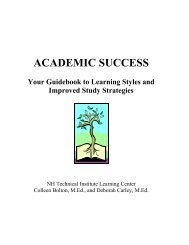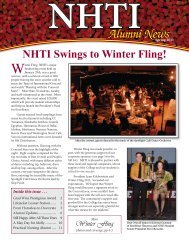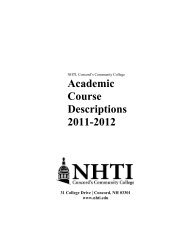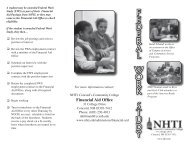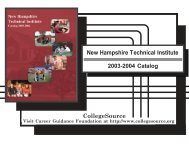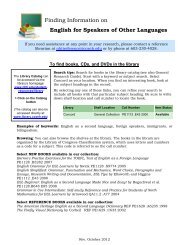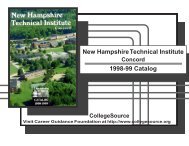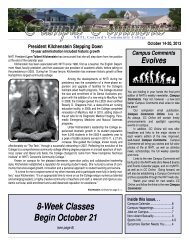Catalog 05-06 - NHTI - Concord's Community College
Catalog 05-06 - NHTI - Concord's Community College
Catalog 05-06 - NHTI - Concord's Community College
- No tags were found...
Create successful ePaper yourself
Turn your PDF publications into a flip-book with our unique Google optimized e-Paper software.
Copyright & Disclaimer Information: Copyright © 1994, 1995, 1996, 1997, 1998, 1999, 2000, 2001, 2002, 2003, 2004, 20<strong>05</strong>, 20<strong>06</strong>, 2007. <strong>College</strong>Source®, Inc. and Career Guidance Foundation. <strong>College</strong>Source® digital catalogs are derivative works owned and copyrighted by <strong>College</strong>Source®, Inc. and Career Guidance Foundation. <strong>Catalog</strong> content is owned and copyrighted by the appropriate school. While <strong>College</strong>Source®, Inc. and Career Guidance Foundation provides information as a service to the public, copyright is retained on all digital catalogs.Copyright & Disclaimer Information: Copyright © 1994, 1995, 1996, 1997, 1998, 1999, 2000, 2001, 2002, 2003, 2004, 20<strong>05</strong>, 20<strong>06</strong>, 2007. <strong>College</strong>Source®, Inc. and Career Guidance Foundation. <strong>College</strong>Source® digital catalogs are derivative works owned and copyrighted by <strong>College</strong>Source®, Inc. and Career Guidance Foundation. <strong>Catalog</strong> content is owned and copyrighted by the appropriate school. While <strong>College</strong>Source®, Inc. and Career Guidance Foundation provides information as a service to the public, copyright is retained on all digital catalogs.Course Descriptionslearners. The content of this course includes a variety of useful techniquesin the field, including the strategies for tutoring learners in developingreading comprehension skills. Through interactive instruction, groupdiscussions and practical activities, students will demonstrate a clear understandingof their role as educational supporters of ESOL teachers andlanguage tutors in assisting ESOL learners with school work, culturaltransition and social interaction. This course includes a minimum of 45hours of practicum which provides the opportunity to apply the techniqueslearned in class. (Prerequisite: ED 101 or ED 104 and/or permissionof the department head of Education)ED 230 Essentials of Career and TechnicalCurriculum and Instruction 3-0-3This course will explore the history, philosophy, principles, organization,and operation of career and technical education in the United States.Students will develop a functional understanding of the role and responsibilitiesof a professional career and technical educator. This course willprovide the participant with the foundation and skills needed to design,implement and manage a curriculum in career and technical education.Identification of resources and occupational analysis, derivation of content,formulation of objectives, defining measurable learning outcomesand the selection and development of activities and evaluation methodswill be explored.Electronic Engineering TechnologyIn addition to listed prerequisites, students must earn grades of “C-“ or higher ineach course to progress in the program.EL 101 Electric Circuits 3-3-4A beginning course in electricity, this course covers basic electric circuittheory, the nature of electricity, resistance, current and voltage. Detailedcoverage of topics includes direct current, alternating current, Ohm’slaw, series circuits and parallel circuits as well as energy and power relationships.This course also covers dc circuit analysis techniques includingmesh and nodal analysis, and network theorems such as Norton’s,Thevenin’s and maximum power transfer. The transient response of capacitorsand inductors are discussed when a dc voltage is applied using thevarious circuit and analysis techniques. Additional topics include thediscussion of alternating waveform characteristics and analysis of sinusoidalalternating waveforms. Laboratory experiments are designed toreinforce the classroom work. (Corequisite: MT 133 and EL 115 orpermission of the Department Head of Electronic Engineering Technology)EL 102 Circuit Analysis 3-3-4A continuation of Electric Circuits. This course covers A-C circuit analysistechniques including mesh and nodal analysis, and network theoremssuch as Norton's, Thevenin's, and maximum power transfer. Treatment isgiven to circuits containing dependent and independent sources of voltageand current. Resonance and basic filters are covered in detail as wellas magnetism. Additional topics covered, as time allows, are transformersand three-phase circuits. Laboratory experiments are designed to reinforcethe classroom work. (Prerequisites: EL 101, EN 101, and MT 133;or permission of department head of Electronic Engineering Technology)EL 110 Electronics I 3-3-4This is a study of the physical behavior of electronic devices. Emphasis ison analysis and application of electronic circuits utilizing semiconductordiodes, operational amplifiers, and transistors. Topics covered includerectification, clipping and clamping circuits, regulated power supplies,basic op-amps, biasing of transistors, and simplified AC modeling oftransistor circuits. Engineering Design Automation (EDA) tools are usedto reinforce the theory through electronic analysis simulations. Laboratoryexperimentation reinforces classroom theory with practical work.(Prerequisites: EL 101)EL 115 Digital Fundamentals 2-3-3Open to all majors, this introductory digital course is designed for studentswith little or no electronics skills. Topics covered include basic logicgates, Base 2, 10, and 16 number systems, BCD, Gray and ASCII codes,Boolean algebra, Karnaugh maps, flip-flops, counters, programmable logicdevices and other related digital devices. Hands-on laboratory experiments,which augment the learning process, are an integral part of thiscourse. The labs demonstrate real world implementation of otherwiseabstract academic concepts and provide valuable experience in breadboarding,testing and debugging circuits. (Prerequisite: Algebra I or permissionof department head of Electronic Engineering Technology)EL 144 Embedded Microsystems 3-3-4Personal computers are used to host an integrated hardware/softwaredevelopment system for applications with embedded Microcontrollers. Asystem level approach to the specification, decomposition, hardware/software development, and system integration for the implementation ofembedded systems is covered through lecture and laboratory experiments.Topics covered include microprocessor architecture, instruction sets, interfacing,and real-time programming techniques in assembly language.Laboratory exercises consist of system level development in serial andparallel data transfer, data acquisition, and analog input and output signalprocessing. (Prerequisites: CP 107, EL 101 and EL 115 or permission ofdepartment head of Electronic Engineering Technology)EL 210 Electronics II 3-3-4This course is a continuation of Electronics I covering more advancedelectronics topics with a variety of applications. The non-ideal characteristicsof op-amps and other electronic devices will be discussed withapplications emphasizing offset, gain and linearity. Other topics may includebut are not limited to: sensors, pulse width modulations, Bodeplots, SCRs, TRIACs and optoelectronics. EDA tools are used to reinforcethe theory with electronic analysis simulations. (Prerequisites: EL110; corequisite: EL 102 or permission of the Department Head ofElectronic Engineering Technology)EL 215 Advanced Digital Electronics 3-3-4Advanced topics in digital electronics are covered in this course. Thesetopics include the internal structure of logic families, complex digitalcircuits, synchronous logic, A/D and D/A conversion, timing diagrams,computer bus systems, programmable logic devices (PLD), and complexcircuit debugging using a logic analyzer. The topic of digital interfacing isalso covered. This includes interfacing various logic families to each otheras well as interfacing logic to various /O loads, such as inductive loadsand 120VAC loads. (Prerequisites: CP 107, EL 110, EL 115 or permissionof department head of Electronic Engineering Technology)EL 251 Advanced Topics in Electronics 3-3-4This course introduces students to advanced applications in electronics.Topics covered include but are not limited to: an introduction to electroniccommunication theory including digital communications, fiberoptics, programmable logic controllers and human-machine interface.Laboratory exercises are used to reinforce classroom theory. (Prerequisite:EL 210 or permission of the Department Head of Electronic EngineeringTechnology)EL 3<strong>05</strong> Design Project Preparation 1-5-3This course contains the background material and preparation necessaryfor Senior Design Project (EL 3<strong>06</strong>) and consists of two separate learningmodules which are studied concurrently. Module one covers the mechanicsof designing and fabricating printed circuit boards. This includes theuse of Electronic Design Automation (EDA) tools including, but notlimited to, schematic capture and printed circuit board layout. An overviewof current industry standards of workmanship and safety is included.In the second module, the student selects a project, obtains approvalfor that project and develops project definition. Much latitude isgiven in selecting a project. Projects may be undertaken individually or asteams. They may be internal or collaborative with industry. The projectmay involve developing a specific circuit or a more general exposure in an100



